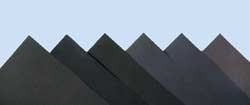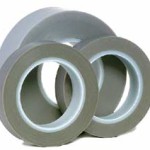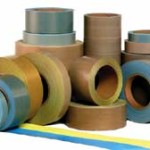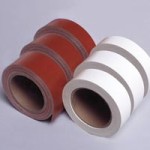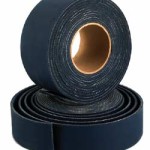Description
Conductive Teflon Tape (264 Series)
DuraStick® Anti-Static & Thermal Conductive series 264 tapes utilize DuraFab® Fabrics but have the added benefit of an adhesive on one side. These tapes are black in color and are specially formulated to dissipate surface static build-up and allow optimal thermal conductivity. These tapes are manufactured from woven fiberglass substrates, have an optimum PTFE (Fluon®) content, leave a minimal fabric impression, and have our Super Stick Clean Release silicone adhesive or an acrylic adhesive system. Because of the glass reinforcement, this series of tape is resistant to “cold-flow,” a characteristic inherent in pure unsupported PTFE films, these tapes are an excellent choice when cut through, load carrying, or harsh industrial environments require the unique surface characteristics of PTFE. DuraStick® Anti-Static & Thermal Conductive series 264 is a very durable and versatile product which makes it an ideal material for heat sealers, form-fill-seal equipment, high speed poly bag manufacturing, lining of guide rails, chutes and slides and for release applications in the aerospace industry. | ||||||||||||||||||||||||||||||||||||||
DuraStick® Anti-Static & Thermal Conductive Tape Characteristics | ||||||||||||||||||||||||||||||||||||||
DuraStick® Anti-Static & Thermal Conductive tapes are engineered to retain the distinctive properties of PTFE; however, by adding a glass fabric to the matrix, AFC is able to obtain the added benefits of dimensional stability, excellent tensile strength and extremely low elongation (<1%). In addition, the DuraStick® Anti-Static & Thermal Conductive tapes with silicone adhesive operate over a wide temperature range, -100°F to +500°F (-73°C to 260°C), while tapes with acrylic adhesives operate over a narrower range of temperatures, -40°F to 350°F (-40°C to 177°C). | ||||||||||||||||||||||||||||||||||||||
Typical Applications | ||||||||||||||||||||||||||||||||||||||
Packaging: Food Products: Printing and Textiles: Building Products: Chemical Processing: | Aerospace, Communications & Pulp and Paper: Electronics: Other Applications: Additional applications exist. Contact AFC for more specific information. | |||||||||||||||||||||||||||||||||||||
Styles Available | ||||||||||||||||||||||||||||||||||||||
| ||||||||||||||||||||||||||||||||||||||
Please note: Additional thicknesses and styles available upon special order. | ||||||||||||||||||||||||||||||||||||||


